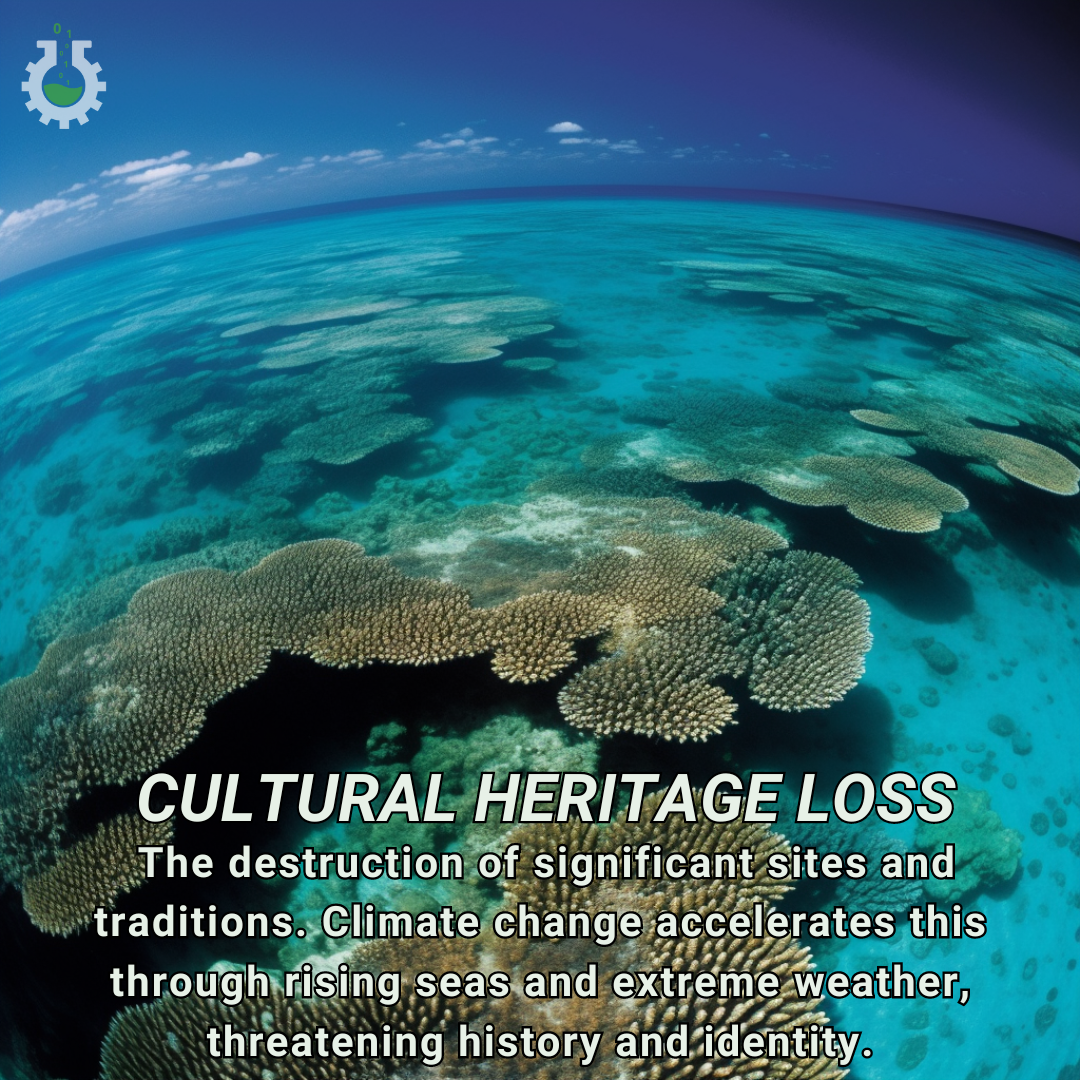June 21, 2024
Climate Change Poster Collection of the Day – Cultural Heritage Loss
Book a Demo
Today’s Climate Change Poster Collection highlights Cultural Heritage Loss. Refers to the degradation or destruction of cultural sites, practices, and artifacts that hold historical, artistic, or social significance. As the impacts of climate change become increasingly severe, this often-overlooked consequence is gaining attention. From ancient ruins and historical landmarks to traditional practices and indigenous knowledge, climate change is posing a significant threat to our shared heritage. Rising sea levels, increased frequency of natural disasters, and extreme weather events are causing irreversible damage to many irreplaceable cultural sites.
Coastal areas, home to numerous historical landmarks, are particularly vulnerable to erosion and flooding. For instance, the ancient city of Venice is grappling with frequent and severe flooding, threatening its architectural marvels and rich history. The Acqua Alta, or high water, has become a regular occurrence, submerging the city’s iconic piazzas and basilicas, and causing long-term damage to their foundations. Similarly, the iconic Moai statues on Easter Island are at risk due to coastal erosion. These monolithic human figures, carved by the Rapa Nui people, are not just monumental sculptures but are also repositories of cultural and spiritual significance. The erosion of the coastline is gradually undermining the platforms on which these statues stand, posing a threat to their stability and preservation.
Beyond physical sites, climate change is also endangering intangible cultural heritage. Traditional agricultural practices, folklore, and indigenous knowledge are being disrupted as communities are forced to adapt to new environmental conditions. For example, the Sami people of Northern Europe, who have herded reindeer for centuries, are finding it increasingly difficult to maintain their traditional practices due to changing snow and ice patterns. This loss is not just about preserving the past; it has profound implications for community identity and continuity. Cultural heritage provides a sense of belonging and continuity, linking generations and fostering social cohesion. Its loss can lead to a weakened sense of identity and community, exacerbating the social impacts of climate change.
Furthermore, the destruction of cultural heritage sites can have significant economic repercussions, particularly for communities reliant on tourism. The Great Barrier Reef, a UNESCO World Heritage site, is not only a natural wonder but also a cultural and economic asset for Australia. The reef’s degradation due to coral bleaching, driven by rising sea temperatures, threatens the livelihoods of local communities dependent on tourism. Similarly, the ancient ruins of Machu Picchu in Peru face the dual threats of increased rainfall and landslides, jeopardizing both the site and the tourism industry that supports the local economy.
As we strive to mitigate and adapt to climate change, it is crucial to integrate cultural heritage preservation into our strategies. This includes investing in the resilience of cultural sites, supporting communities in maintaining their intangible heritage, and incorporating traditional knowledge into climate adaptation practices. For instance, the use of traditional building techniques, which have evolved to withstand local environmental conditions, can offer valuable insights into creating more resilient structures. Additionally, involving local communities in conservation efforts ensures that preservation strategies are culturally sensitive and effective.
International cooperation and funding are also essential in safeguarding cultural heritage. Organizations like UNESCO are working to raise awareness and mobilize resources for the protection of cultural sites at risk. However, more comprehensive and coordinated efforts are needed to address the scale of the challenge. By doing so, we not only safeguard our past but also enrich our collective future, ensuring that the stories, knowledge, and identity embedded in our cultural heritage continue to inspire and guide us.
The loss of cultural heritage due to climate change is a multifaceted issue that affects not only the physical remnants of our history but also the social fabric and economic well-being of communities worldwide. Addressing this silent casualty requires a holistic approach that combines scientific research, community engagement, and international collaboration. By prioritizing the preservation of cultural heritage in our climate strategies, we can build a more resilient and inclusive future, honoring the legacy of our ancestors and empowering future generations.
Discover an inspiring collection of climate change poster.



